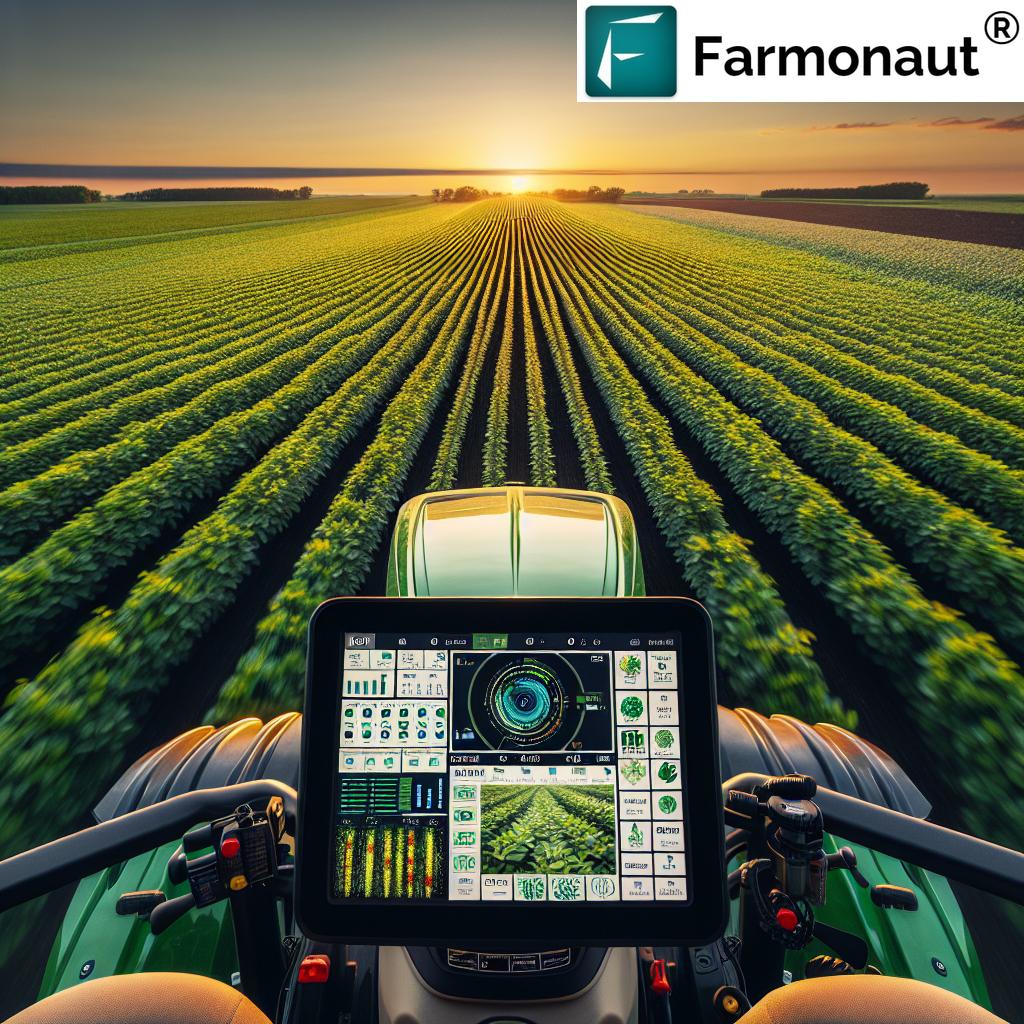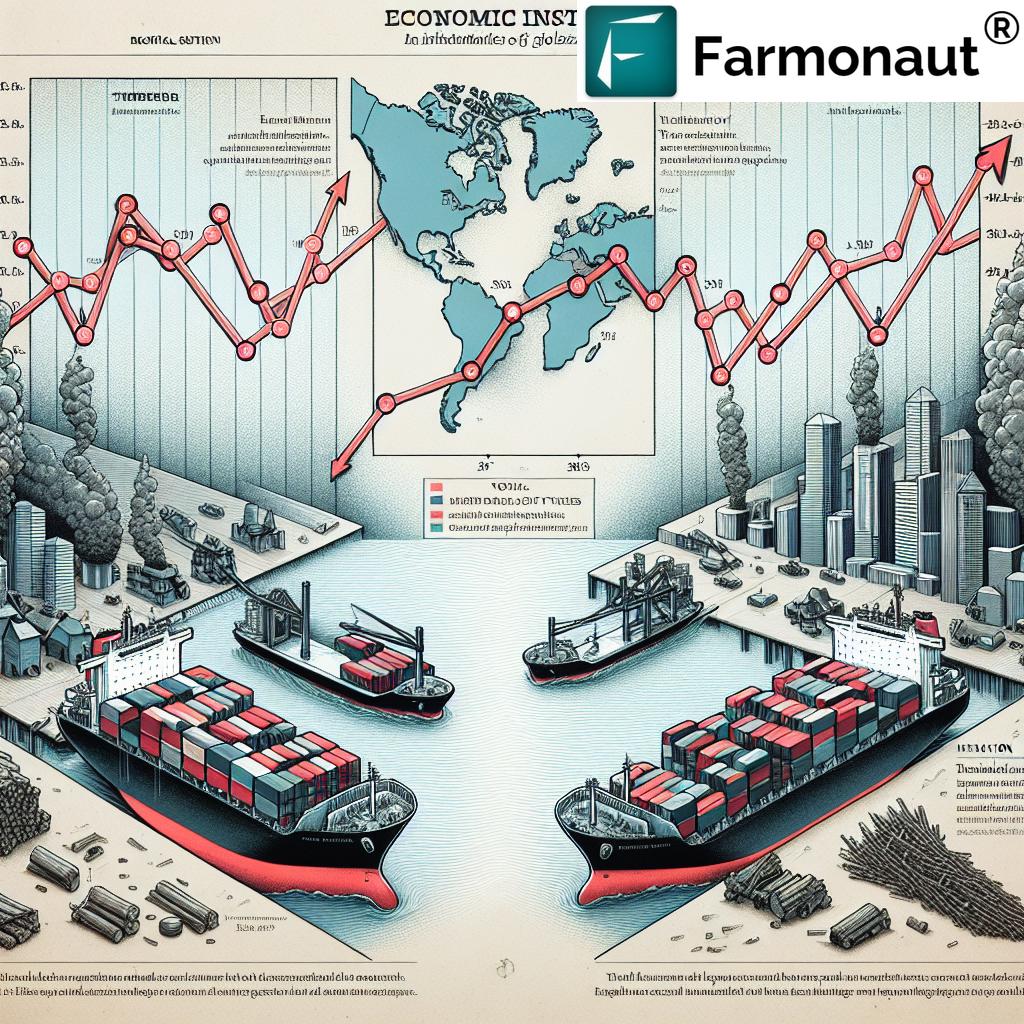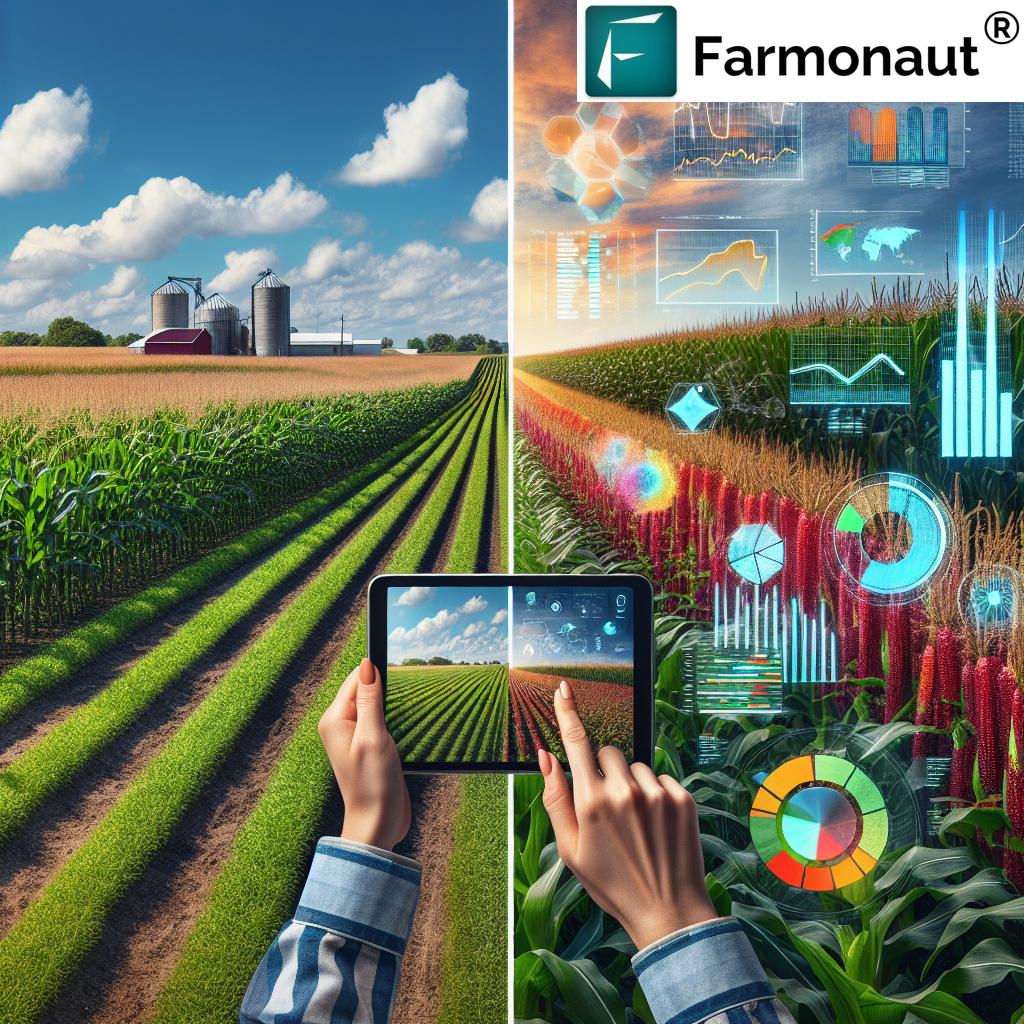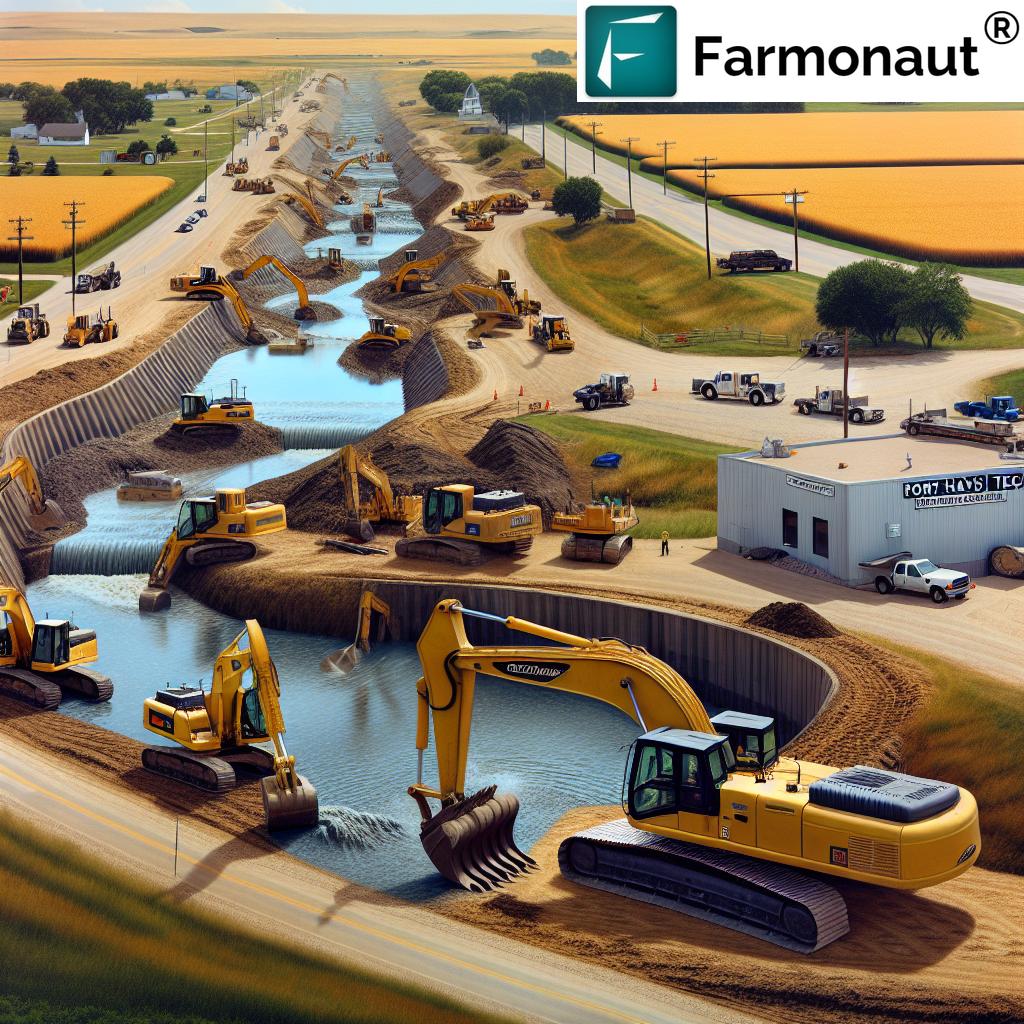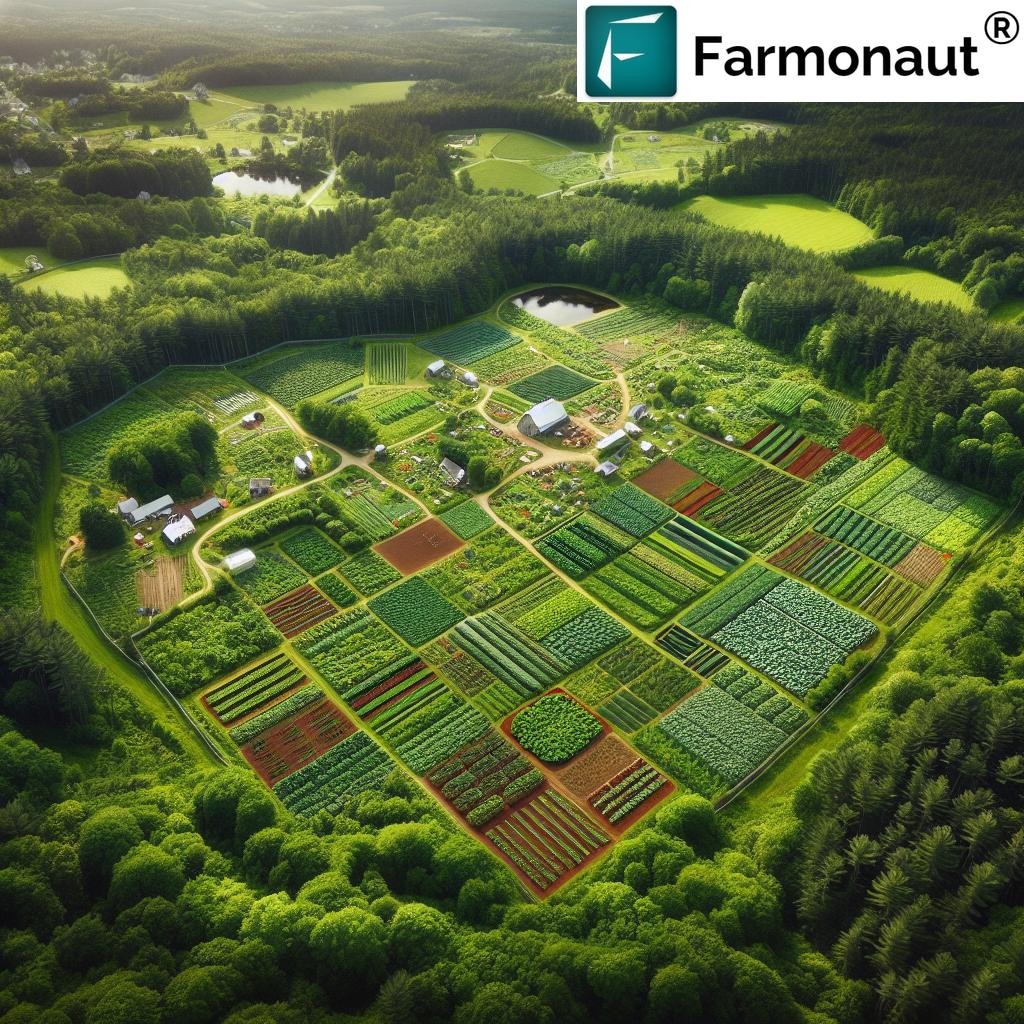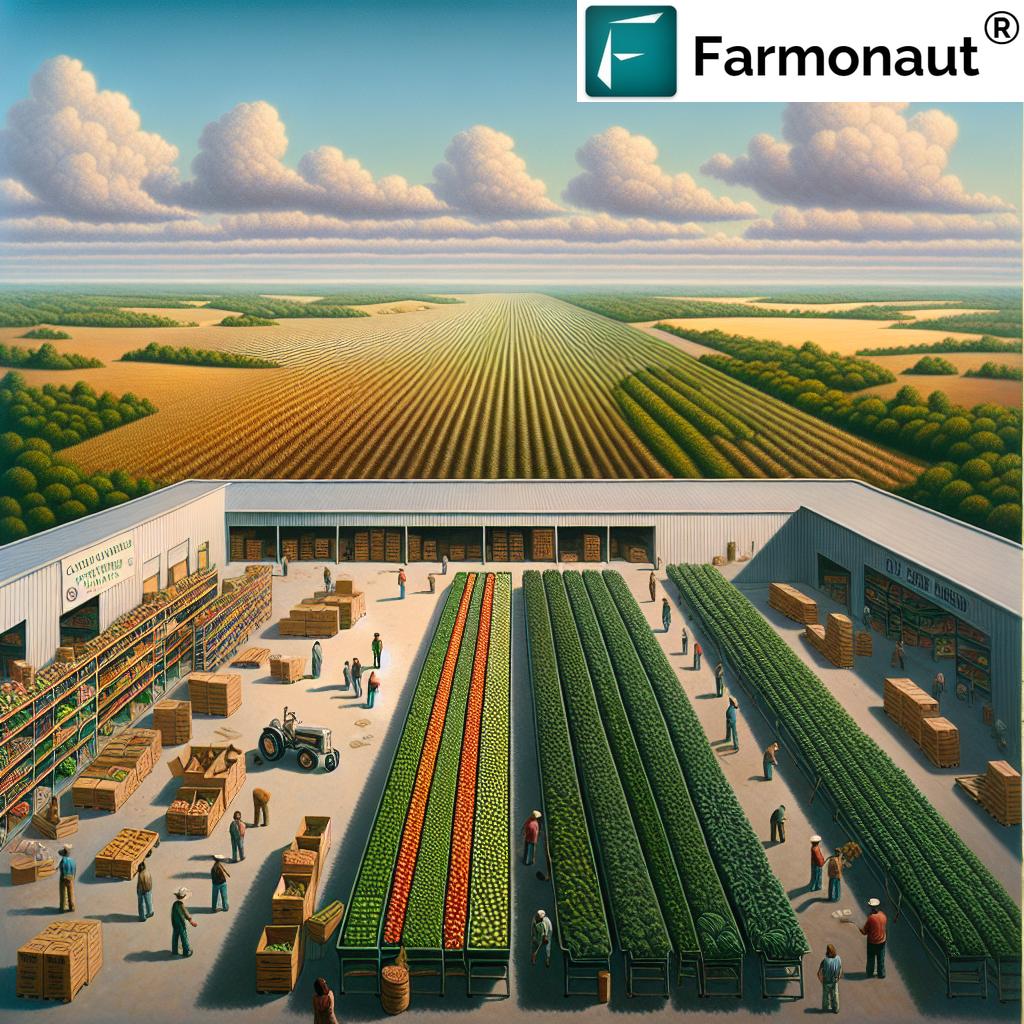Revolutionizing Midwest Farm Management: How Farmonaut’s Precision Agriculture Techniques Transform Livestock Producers’ Sustainability
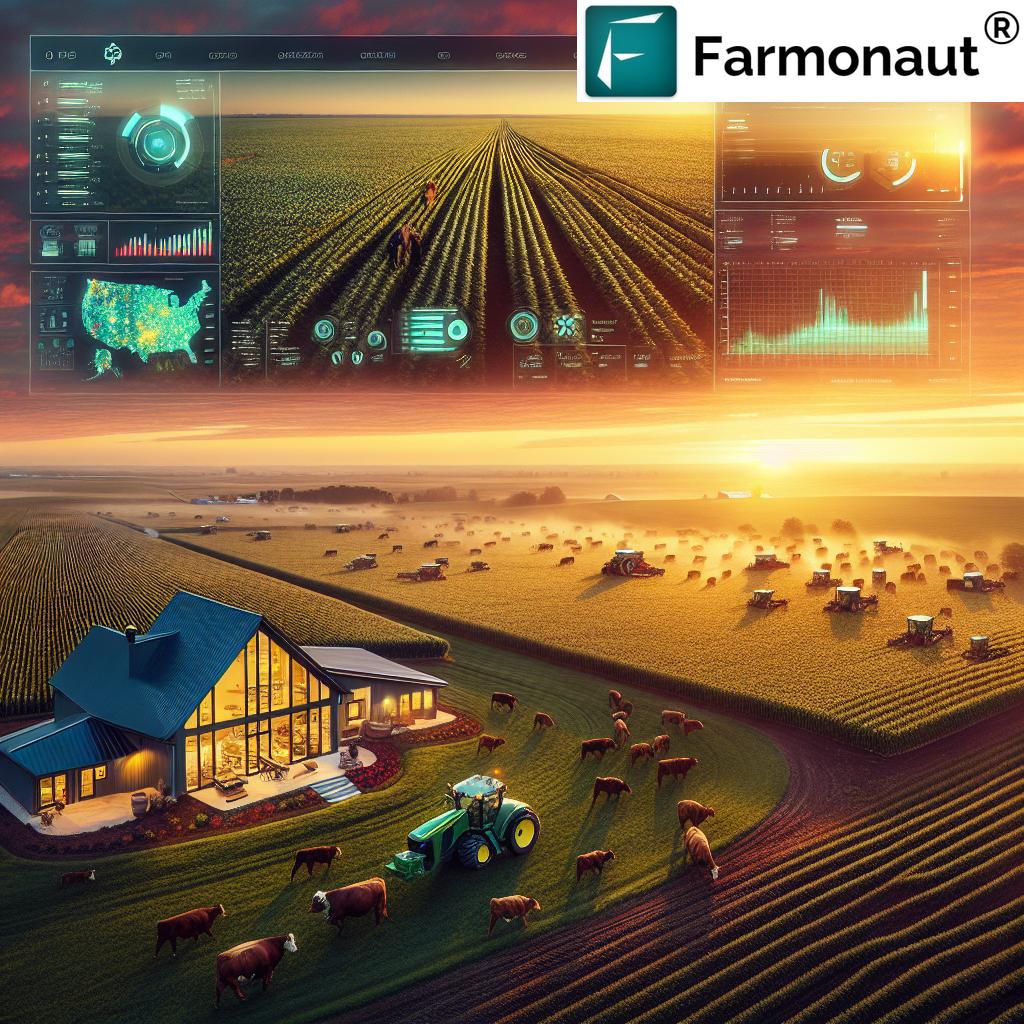
“Over 150 years of agricultural association history has shaped modern livestock industry practices and policies.”
In the heart of America’s breadbasket, a revolution is underway. The Midwest, long known for its vast prairies and thriving livestock industry, is witnessing a transformation in farm management practices. At the forefront of this change is Farmonaut, a pioneering agricultural technology company that’s reshaping the landscape of livestock production with its cutting-edge precision agriculture techniques. As we delve into this fascinating evolution, we’ll explore how the rich history of agricultural associations has paved the way for today’s innovative solutions.
The Historical Roots of Agricultural Associations
To understand the significance of today’s agricultural innovations, we must first look back at the tumultuous 1860s, a period that saw the birth of many influential farmer organizations. These associations emerged as a response to the challenges faced by livestock producers in the United States, particularly in the Midwest region.
- Formation of state and national livestock associations
- Lobbying efforts for producers’ rights
- Influence on key agricultural legislation
The establishment of these organizations marked a turning point for the agricultural community. Farmers and ranchers, once isolated in their struggles, found strength in unity. These associations became the voice of the agricultural sector, advocating for the rights and interests of livestock producers across the country.
The Evolution of Farm Policy
As we moved from the 19th into the 20th century, agricultural associations played a pivotal role in shaping farm policy. Their influence extended from the local to the federal level, impacting legislation that would define the future of American agriculture.
Key developments included:
- Grazing rights legislation
- Economic support programs for farmers
- Regulation of railroad pricing for agricultural transport
These policies were crucial in addressing the economic pressures faced by livestock producers. They ensured fair practices and provided a safety net during times of hardship, contributing to the stability and growth of the agricultural sector.
Technological Advancements in Farming
The 20th century brought about significant technological advancements that revolutionized farming practices. From the introduction of mechanized equipment to the development of improved breeding techniques, these innovations dramatically increased productivity and efficiency in livestock management.
Notable advancements included:
- Mechanization of farm equipment
- Improved animal husbandry practices
- Introduction of data-driven decision-making
These technological leaps forward set the stage for the precision agriculture techniques we see today. They demonstrated the profound impact that innovation could have on the sustainability and profitability of livestock production.
The Rise of Precision Agriculture
As we entered the digital age, the concept of precision agriculture began to take shape. This approach to farm management uses information technology to ensure that crops and livestock receive exactly what they need for optimal health and productivity. It’s at this intersection of technology and traditional farming practices that Farmonaut has made its mark.
Farmonaut’s precision agriculture techniques build upon this legacy of innovation, offering livestock producers in the Midwest and beyond a suite of advanced tools to enhance their operations:
- Satellite-based crop health monitoring
- AI-driven advisory systems
- Blockchain-based traceability solutions
- Resource management tools
These cutting-edge technologies are transforming the way livestock producers manage their farms, leading to improved sustainability and efficiency.
Farmonaut: Bridging the Past and Future of Agriculture
Farmonaut’s approach to farm management is rooted in the understanding that sustainable agriculture requires a balance between traditional knowledge and modern technology. By leveraging satellite imagery, artificial intelligence, and blockchain technology, Farmonaut provides livestock producers with unprecedented insights into their operations.
Key features of Farmonaut’s platform include:
- Real-time crop health monitoring using multispectral satellite images
- Personalized farm advisory through the Jeevn AI system
- Blockchain-based product traceability for enhanced supply chain transparency
- Fleet and resource management tools for optimized operations
- Carbon footprinting capabilities to support sustainable practices
These tools empower livestock producers to make data-driven decisions, optimize resource allocation, and improve overall farm productivity.
“State and national livestock associations have influenced numerous key legislations affecting millions of farmers since the 1860s.”
The Impact on Midwest Livestock Producers
For livestock producers in the Midwest, Farmonaut’s precision agriculture techniques offer a range of benefits that address long-standing challenges in the industry:
- Improved feed crop management
- Enhanced pasture rotation strategies
- More efficient water usage
- Better animal health monitoring
- Reduced environmental impact
By adopting these innovative solutions, Midwest farmers are not only improving their bottom line but also contributing to the long-term sustainability of the livestock industry.
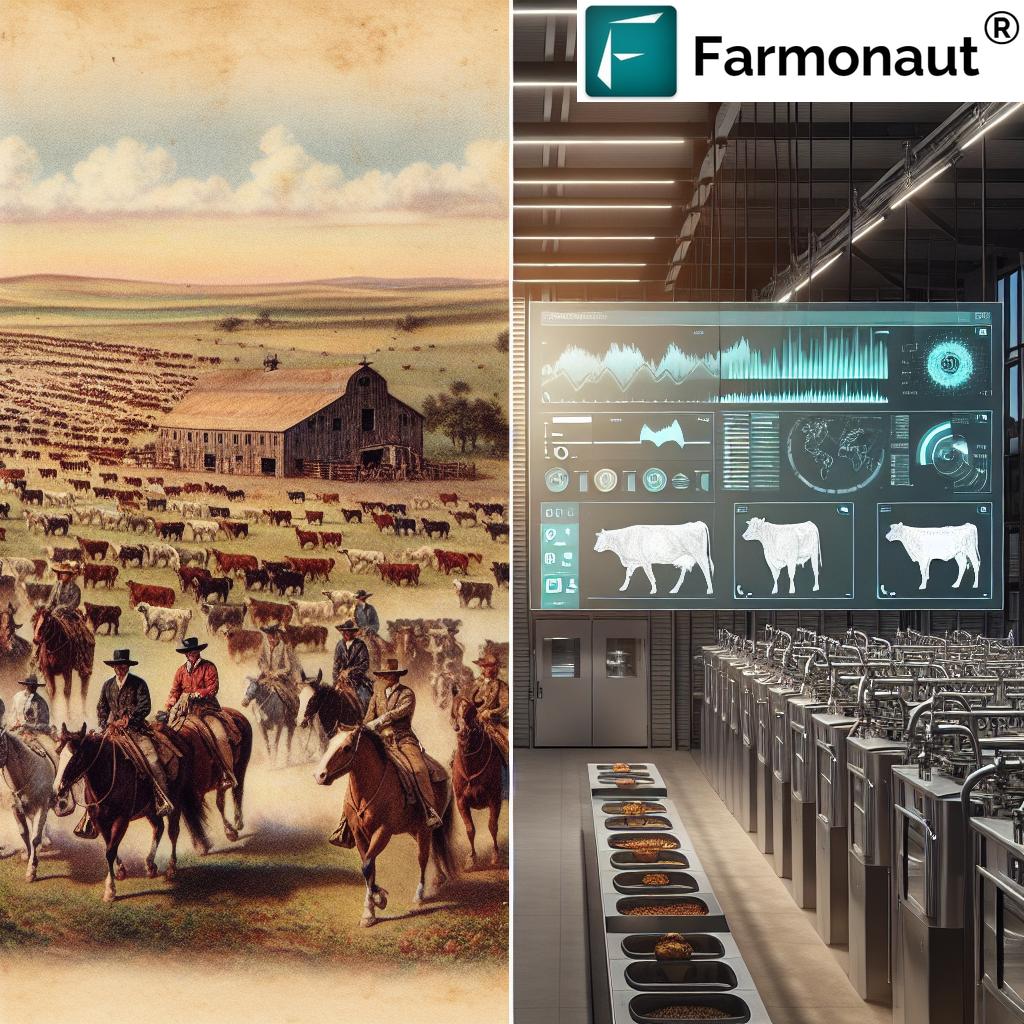
Sustainability in Modern Livestock Production
Sustainability has become a critical concern in the agricultural sector, particularly in livestock production. Farmonaut’s precision agriculture techniques address this issue head-on by promoting practices that reduce resource consumption and minimize environmental impact.
Sustainable practices enabled by Farmonaut include:
- Optimized irrigation based on real-time soil moisture data
- Targeted application of fertilizers and pesticides
- Improved land use through data-driven pasture management
- Reduced carbon footprint through efficient resource allocation
These practices not only benefit the environment but also contribute to the long-term viability of livestock operations in the Midwest and beyond.
The Role of Agricultural Associations Today
While technology plays an increasingly important role in modern farming, agricultural associations continue to be vital in supporting livestock producers. These organizations have evolved to meet the changing needs of their members, often serving as a bridge between traditional practices and innovative technologies.
Contemporary roles of agricultural associations include:
- Providing education on new farming technologies
- Advocating for policies that support precision agriculture
- Facilitating networking and knowledge sharing among producers
- Partnering with technology providers to offer member discounts
By embracing innovations like those offered by Farmonaut, these associations are helping to ensure that livestock producers in the Midwest remain at the forefront of agricultural progress.
Challenges and Opportunities
The adoption of precision agriculture techniques presents both challenges and opportunities for Midwest livestock producers. While the potential benefits are significant, there are hurdles to overcome:
- Initial investment in technology
- Learning curve for new systems
- Integration with existing farm practices
- Data privacy and security concerns
However, the opportunities far outweigh these challenges. Producers who embrace these technologies stand to gain:
- Increased productivity and efficiency
- Improved animal welfare
- Enhanced market competitiveness
- Greater resilience to climate change impacts
Farmonaut’s user-friendly platform and comprehensive support system help mitigate many of these challenges, making the transition to precision agriculture smoother for livestock producers.
The Future of Midwest Livestock Production
As we look to the future, it’s clear that precision agriculture techniques will play an increasingly important role in Midwest livestock production. The integration of technologies like those offered by Farmonaut is set to transform the industry, leading to more sustainable, efficient, and profitable operations.
Future trends we can expect to see include:
- Greater integration of AI and machine learning in farm management
- Increased use of drone technology for monitoring and data collection
- Further development of blockchain solutions for supply chain transparency
- Expansion of IoT devices for real-time monitoring of livestock health and behavior
By staying at the forefront of these technological advancements, Midwest livestock producers can ensure their continued success in an ever-changing agricultural landscape.
Timeline of Key Events in Midwest Agricultural Associations and Livestock Industry
| Year | Event | Impact on Livestock Producers |
|---|---|---|
| 1867 | Formation of the National Grange | Provided a unified voice for farmers, advocating for their interests |
| 1880s | Establishment of state livestock associations | Improved local representation and support for producers |
| 1906 | Passage of the Pure Food and Drug Act | Enhanced food safety standards, impacting livestock processing |
| 1933 | Agricultural Adjustment Act | Provided price supports and production controls |
| 1950s-60s | Green Revolution | Increased crop yields, benefiting livestock feed production |
| 1994 | Introduction of GPS in agriculture | Enabled precision farming techniques |
| 2000s | Rise of digital agriculture | Improved data-driven decision making in livestock management |
| Present | Integration of AI and satellite technology | Enhanced sustainability and efficiency in livestock production |
Conclusion: Embracing the Future of Livestock Production
The journey from the formation of the first agricultural associations in the 1860s to today’s advanced precision agriculture techniques has been one of continuous innovation and adaptation. Midwest livestock producers have consistently demonstrated their resilience and willingness to embrace new technologies and practices to overcome challenges and improve their operations.
Farmonaut’s precision agriculture techniques represent the latest chapter in this ongoing evolution. By providing livestock producers with powerful tools for data-driven decision-making, resource optimization, and sustainable management, Farmonaut is helping to secure the future of the Midwest’s vital livestock industry.
As we move forward, the combination of traditional agricultural knowledge, innovative technology, and the enduring spirit of cooperation that has long characterized the Midwest’s farming communities will continue to drive progress in livestock production. By embracing these advancements, Midwest livestock producers are not only ensuring their own success but also contributing to the broader goals of food security, environmental sustainability, and rural economic development.
The revolution in Midwest farm management is well underway, and with tools like those provided by Farmonaut, the future of livestock production looks brighter than ever.
FAQ Section
Q: How does Farmonaut’s technology benefit livestock producers specifically?
A: Farmonaut’s precision agriculture techniques help livestock producers optimize feed crop management, improve pasture rotation, enhance water usage efficiency, and monitor animal health more effectively. This leads to increased productivity and sustainability in livestock operations.
Q: Is Farmonaut’s platform suitable for small-scale farmers in the Midwest?
A: Yes, Farmonaut’s solutions are designed to be scalable and accessible to farmers of all sizes. The platform offers different pricing tiers and flexible options to accommodate the needs of both small-scale and large-scale livestock producers.
Q: How does Farmonaut’s technology contribute to sustainable farming practices?
A: Farmonaut’s precision agriculture techniques promote sustainability by optimizing resource use, reducing waste, and minimizing environmental impact. Features like real-time crop health monitoring and carbon footprinting help farmers make more environmentally conscious decisions.
Q: Can Farmonaut’s solutions integrate with existing farm management systems?
A: Farmonaut offers API access, allowing for integration with other farm management systems. This flexibility enables livestock producers to incorporate Farmonaut’s advanced features into their existing workflows seamlessly.
Q: How does Farmonaut ensure data privacy and security for its users?
A: Farmonaut prioritizes data privacy and security, implementing robust measures to protect user information. The use of blockchain technology in their traceability solutions also enhances data security and transparency.
Access Farmonaut’s innovative solutions:
For developers: API | API Developer Docs












